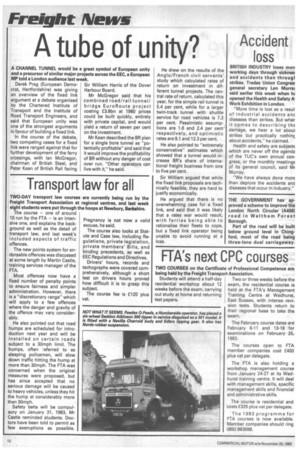A tube of unity?
Page 8

If you've noticed an error in this article please click here to report it so we can fix it.
A CHANNEL TUNNEL would be a great symbol of European unity and a precursor of similar major projects across the EEC, a European MP told a London audience last week.
Derek Prag (European Democrat, Hertfordshire) was giving an overview of the fixed link argument at a debate organised by the Chartered Institute of Transport and the Institute of Road Transport Engineers, and said that European unity was one of the strongest arguments in favour of building a fixed link.
In the course of the debate, two competing cases for a fixed link were ranged against that for further development of the ferry crossings, with Ian McGregor, chairman of British Steel, and Peter Kean of British Rail facing Sir William Harris of the Dover Harbour Board.
Mr McGregor said that his combined road/rail tunnel/ bridge EuroRoute project costing £3.8bn at 1980 prices could be built quickly, entirely with private capital, and would yield a return of seven per cent on the investment.
Mr Kean described the BR plan for a single bore tunnel as "potentially profitable" and said that it would improve the profitability of BR without any danger of cost over run. "Other operators can live with it," he said.
He drew on the results of the Anglo/French civil servants' study which calculated rates of return on investment in different tunnel projects. The central rate of return, calculated this year, for the simple rail tunnel is 5.4 per cent, while for a larger twin-track tunnel with shuttle service for road vehicles is 7.3 per cent. Pessimistic assump-. tions are 1.6 and 2.4 per cent' respectively, and optimistic rates are 9.1 and 12.3 per cent.
He also pointed to "extremely conservative" estimates which showed that a tunnel would increase BR's share of international freight business from one to five per cent.
Sir William argued that while the fixed link proposals are technically feasible, they are hard to justify economically.
He argued that there is no overwhelming case for a fixed link, and said that it was likely that a rates war would result, with ferries being able to rationalise their fleets to cope, but a fixed link operator being unable to avoid running at a loss.












































